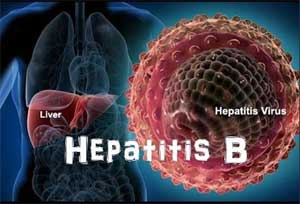- Home
- Editorial
- News
- Practice Guidelines
- Anesthesiology Guidelines
- Cancer Guidelines
- Cardiac Sciences Guidelines
- Critical Care Guidelines
- Dentistry Guidelines
- Dermatology Guidelines
- Diabetes and Endo Guidelines
- Diagnostics Guidelines
- ENT Guidelines
- Featured Practice Guidelines
- Gastroenterology Guidelines
- Geriatrics Guidelines
- Medicine Guidelines
- Nephrology Guidelines
- Neurosciences Guidelines
- Obs and Gynae Guidelines
- Ophthalmology Guidelines
- Orthopaedics Guidelines
- Paediatrics Guidelines
- Psychiatry Guidelines
- Pulmonology Guidelines
- Radiology Guidelines
- Surgery Guidelines
- Urology Guidelines
Birth dose of hepatitis B vaccine may not be necessary: study

A new study by a group of Indian Pediatricians shows that many newborns are protected from Hepatitis B infection by antibodies they receive from the mother and therefore hepatitis B vaccination at birth may not be necessary.
Hepatitis B, a viral infection which causes liver cirrhosis or liver cancer, is a cause of one lakh deaths per year in India. This disease spreads by contact with infected blood or body fluids and can pass from mother to baby, child to child, through blood transfusions and unprotected sexual contact. Over 40 million Indians are chronically infected with Hepatitis B. Many people can live without symptoms for years and once they realize they have an infection, it is often too late for treatment.
Infants (below 1 year) are most susceptible to this virus accounting for 90% of cases. Therefore, the National Immunization Policy recommends a pragmatic vaccination schedule wherein the vaccine is given at birth for institutional deliveries and at 6 week to children born outside such health-care settings (due to practical inabilities). This research study, funded by Indian Council of Medical Research (ICMR), was conducted to examine if the birth dose is crucial for attaining full immunity against hepatitis B infection.
For the study, blood samples from 1-5-year old children from five states - Delhi, Rajasthan, Uttar Pradesh, Uttarakhand and Gujarat - were collected to measure antigen and antibodies of Hepatitis B virus. Among these, 880 children were completely immunized and were given a birth dose of hepatitis B vaccine, 686 were completely immunized but were not given a birth dose of hepatitis B vaccine and 844 were unvaccinated. It was found that children who were given complete vaccination (with or without birth-dose of hepatitis B vaccine) had a similar level of protection against infection. This means birth dose may not be necessary for full immunization to this virus.
A large number of children who were unvaccinated also showed the presence of antibodies. The present study together with earlier evidence suggests that these antibodies are passively acquired from mothers and give protection to newborns (without a birth dose) and those who remain unvaccinated.
“We found birth dose was not needed as infection rates were the same regardless of birth dose. However, if the mother is a hepatitis B carrier especially if she is e-antigen positive, the baby must be vaccinated at birth”, Dr. Jacob Puliyel, the study's primary author and a pediatrician at St. Stephens Hospital in Delhi, told India Science Wire.
Dr. Puliyel added “studies must be replicable before they can be accepted. We now have two studies, one from South India and this one from North India showing that many babies have acquired passive immunity that may be protecting them soon after birth when they are most vulnerable to develop chronic hepatitis. Further, studies may be done to confirm these findings.”
The research findings have published in the Indian Journal of Pediatrics. The research team included Jacob Puliyel (St Stephens Hospital, New Delhi), Pathik Naik (Pathik Children’s Hospital, Surat), Ashish Puliyel (Consumer CAP HPI, London), Kishore Agarwal (Sardarmal Khandaka Memorial Hospital, Jaipur), Vandana Lal and Nimmi Kansal (Dr Lal Path Labs, New Delhi ), Devki Nandan (Dr. Ram Manohar Lohia Hospital), Vikas Tripathi and Prashant Tyagi (Pt Madan Mohan Malaviya Hospital, New Delhi), Saroj K. Singh (Nazareth Hospital, Allahabad), Rajeev Srivastava (SGRRIM & SMI Hospital, Dehradun), Utkarsh Sharma (Tirthanker Mahavir Medical College, Moradabad), and V. Sreenivas (AIIMS, New Delhi).
To read the article click on the link https://link.springer.com/article/10.1007/s12098-017-2601-0

Disclaimer: This site is primarily intended for healthcare professionals. Any content/information on this website does not replace the advice of medical and/or health professionals and should not be construed as medical/diagnostic advice/endorsement or prescription. Use of this site is subject to our terms of use, privacy policy, advertisement policy. © 2020 Minerva Medical Treatment Pvt Ltd